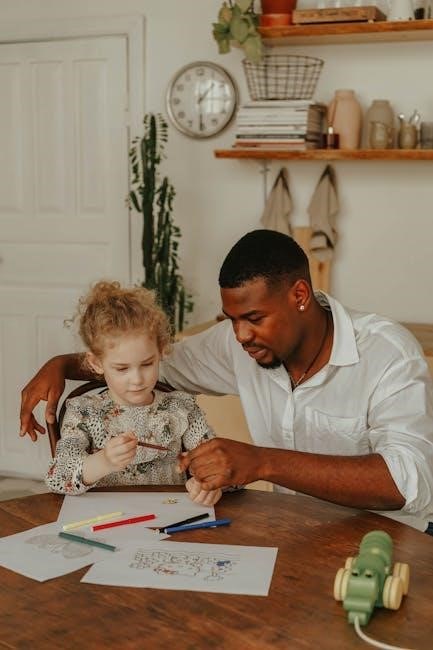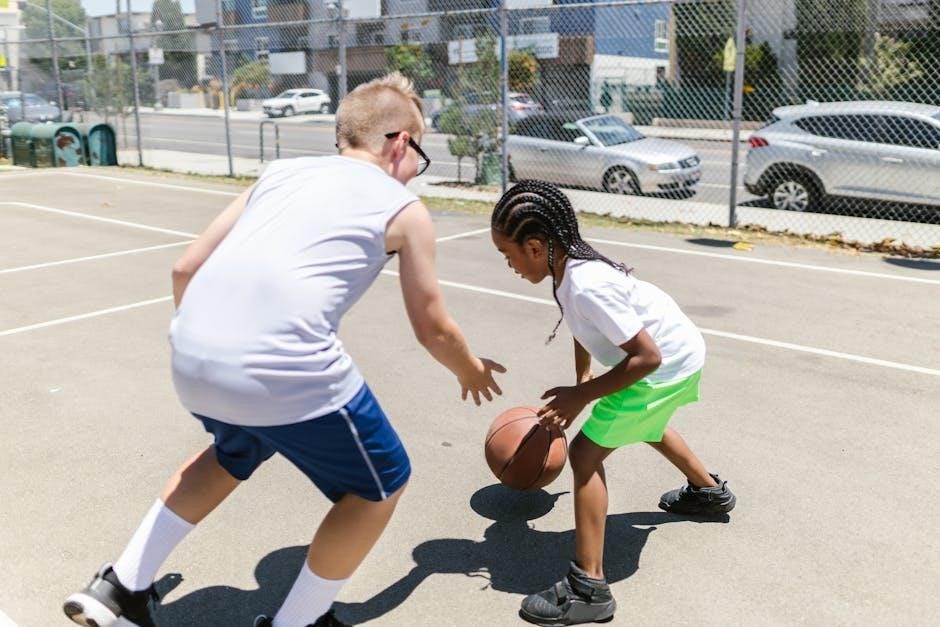Importance of Social Skills Worksheets
Social skills worksheets are essential for developing effective communication, fostering empathy, and enhancing interpersonal interactions․ They provide structured exercises to improve confidence and promote positive social outcomes․
1․1 Why Social Skills Worksheets Are Essential
Social skills worksheets are vital for developing effective communication, empathy, and interpersonal interactions․ They provide structured exercises to help individuals identify and address gaps in their social abilities, fostering confidence and positive outcomes․ These tools are particularly beneficial for children, adolescents, and adults alike, offering practical ways to improve listening, conversation, and emotional intelligence․ By using worksheets, educators and parents can create a consistent learning environment, reinforcing lessons and promoting generalization of skills․ Evidence-based practices, such as video modeling, further enhance their effectiveness․ Overall, social skills worksheets are adaptable, making them an indispensable resource for diverse learning needs and styles․
1․2 Benefits of Using Social Skills Worksheets
Social skills worksheets offer numerous benefits, including improved communication, enhanced empathy, and better emotional intelligence․ They provide structured exercises that help individuals identify and address gaps in their social abilities․ These tools are adaptable for various age groups, ensuring personalized learning․ Worksheets promote self-awareness, active listening, and effective problem-solving․ They also foster consistency in learning environments, making them ideal for educators and parents․ By focusing on specific skills like conversation starters and nonverbal cues, worksheets empower individuals to navigate social situations confidently․ Their accessibility in printable PDF formats further enhances their utility, making them a valuable resource for both personal and professional development․

How to Use Social Skills Worksheets Effectively
Integrate worksheets into daily routines, using visual aids and step-by-step guides to enhance learning․ Provide clear instructions and encourage open discussions to foster engagement and understanding․
2․1 Step-by-Step Guide to Implementing Worksheets
Begin by assessing individual needs to tailor worksheet content․ Introduce activities with clear instructions and visual aids to ensure understanding․ Encourage participants to complete exercises at their own pace, offering guidance when needed․ Afterward, facilitate group discussions to share insights and reinforce learning․ Regularly review progress and adjust strategies to maintain engagement and effectiveness․
2․2 Tips for Educators and Parents
Educators and parents should create a supportive environment for using social skills worksheets․ Start by explaining the purpose of each activity clearly․ Use visual aids and real-life examples to make concepts relatable․ Encourage interactive exercises to keep students engaged․ Provide positive reinforcement for progress, no matter how small․ Foster open discussions to help learners connect their experiences with the worksheet content․ Regularly review and adapt strategies to meet individual needs․ By combining structured activities with empathy and encouragement, educators and parents can maximize the effectiveness of social skills worksheets․ Consistency and patience are key to long-term success․
Types of Social Skills Worksheets
Social skills worksheets include listening exercises, conversation starters, and emotional intelligence activities․ They focus on improving communication, empathy, and nonverbal cues through structured, engaging tasks․
3․1 Listening Skills Worksheets
Listening skills worksheets are designed to help individuals improve their ability to focus, comprehend, and respond appropriately during conversations․ These exercises often include activities such as identifying key points, recognizing nonverbal cues, and practicing active listening techniques․ Worksheets may feature scenarios where students color-code sentences to differentiate between good and poor listening habits, ensuring they understand the importance of eye contact and attentiveness․ Additionally, some resources provide fillable PDFs, allowing users to type their answers directly, making the process interactive and accessible for both children and adults․ These tools are invaluable for fostering effective communication and social interaction․
3;2 Conversation Starters and Maintaining Conversations
Conversation starters and maintaining conversations are crucial for building rapport and fostering meaningful interactions․ Worksheets in this category often include activities that help users identify appropriate topics, practice active listening, and learn to respond thoughtfully․ Exercises may involve role-playing scenarios, identifying good and poor social skills, and completing sentences related to initiating or sustaining discussions․ These tools are particularly helpful for individuals who struggle with social interactions, providing them with structured guidance to improve their communication abilities․ By practicing these skills, users can become more confident and effective in various social settings, whether personal or professional․
3․3 Emotional Intelligence and Empathy Worksheets
Emotional intelligence and empathy are vital for understanding and navigating social interactions․ Worksheets in this category focus on identifying emotions, recognizing social cues, and developing compassionate responses․ They often include exercises like labeling feelings, analyzing scenarios, and practicing perspective-taking․ These tools help users understand how their actions affect others and foster a deeper sense of empathy․ By enhancing emotional awareness, individuals can improve their relationships and communicate more effectively․ These worksheets are especially beneficial for children and adolescents, providing a foundation for lifelong social and emotional well-being․ They are designed to be engaging and educational, making complex concepts accessible and actionable․
3․4 Nonverbal Communication Exercises

Nonverbal communication exercises are designed to help individuals understand and master the cues that go beyond words․ These worksheets focus on interpreting and using body language, facial expressions, eye contact, and gestures effectively․ Activities often include identifying emotions through images, practicing appropriate posture, and role-playing scenarios to demonstrate nonverbal skills․ By enhancing awareness of these subtle yet powerful cues, individuals can improve their ability to convey and interpret messages accurately․ These exercises are particularly useful for building confidence in social interactions and fostering clearer, more meaningful communication․ They are designed to be interactive and engaging, making learning fun and impactful․

Social Skills Worksheets for Different Age Groups
Social skills worksheets are tailored to meet the developmental needs of children, adolescents, and adults, ensuring age-appropriate learning and growth in interpersonal abilities․
4․1 Worksheets for Children
Worksheets for children are designed to be engaging and educational, focusing on foundational social skills like sharing, cooperation, and emotional awareness․ Many PDF resources include coloring pages, matching games, and simple exercises that help kids identify emotions and practice proper interactions․ Activities like “Color the Good Listening Skills” encourage children to differentiate between positive and negative behaviors․ These tools are often interactive, with fillable fields for digital use, making them adaptable for both homeschooling and classroom settings․ By incorporating fun and visual elements, social skills worksheets for children create a supportive environment for young learners to develop essential life skills and build confidence in their interactions․
4․2 Worksheets for Adolescents
Worksheets for adolescents focus on advanced social skills like peer interactions, conflict resolution, and self-esteem building․ These PDF resources often include exercises on initiating conversations, understanding social cues, and managing emotions․ Activities such as role-playing scenarios and reflective journaling help teens navigate complex social dynamics․ Many worksheets address real-life challenges, such as dealing with bullying or maintaining friendships․ They also incorporate therapeutic elements to foster empathy and problem-solving skills․ Designed to be engaging and relevant, these tools help adolescents develop confidence and improve their ability to communicate effectively in various social settings․ They are valuable for educators and parents guiding teens through critical developmental stages․
4․3 Worksheets for Adults
Worksheets for adults are designed to refine social skills like communication, emotional intelligence, and conflict resolution․ These PDF resources often include self-assessment tools, role-playing exercises, and scenarios tailored to professional and personal interactions․ Topics such as active listening, nonverbal communication, and workplace etiquette are commonly addressed․ Adults can benefit from exercises that improve leadership skills, team collaboration, and stress management․ Many worksheets incorporate real-life situations, making them highly relatable․ They are ideal for personal development, workplace training, or therapy sessions․ These tools help adults enhance their relationships, build confidence, and navigate complex social dynamics effectively․ They are adaptable to various learning environments and are widely available as downloadable PDFs or digital files;
Popular Sources for Social Skills Worksheets
Websites like “Talking with Trees” and “Your Therapy Source” offer printable PDFs and digital tools for social skills development․ These resources provide accessible and engaging materials for all ages․
5․1 Recommended Websites and Resources
Several websites offer high-quality social skills worksheets in PDF format․ “Talking with Trees” provides downloadable worksheets focused on conversation skills and emotional intelligence․ “Your Therapy Source” offers printable PDFs for topics like listening and nonverbal communication․ Additionally, resources from authors like Marsha Linehan include worksheets for advanced social skills training․ These websites cater to diverse age groups, ensuring materials are engaging and accessible․ Many resources are designed for educators and parents, offering structured activities to promote social development․ Interactive PDFs with fillable fields are also available, making them suitable for digital classrooms․ These tools are invaluable for fostering social growth in various settings․
5․2 Printable PDF Worksheets
Printable PDF worksheets are a convenient way to teach social skills in structured and engaging ways․ Many resources, like “Talking with Trees,” offer downloadable PDFs that can be printed or shared digitally․ These worksheets often include fillable fields, allowing users to type answers directly․ Activities range from coloring pages that teach listening skills to exercises on maintaining conversations․ Worksheets like “What Is a Good Impression?” help students understand social cues․ They are ideal for educators, parents, and therapists, providing tools to assess and improve social behaviors․ Printable PDFs are versatile, suitable for classrooms, home use, or therapeutic settings, making them an essential resource for fostering social growth․

Incorporating Technology into Social Skills Learning
Technology enhances social skills learning through digital worksheets and interactive tools․ Online platforms offer fillable forms, progress tracking, and engaging activities, making learning more dynamic and accessible for all ages․
6․1 Digital Worksheets and Online Tools

Digital worksheets and online tools revolutionize social skills learning by offering interactive and accessible resources․ Platforms provide fillable PDFs, enabling users to type answers directly, while built-in exercises promote engagement․ These tools are ideal for classrooms, therapy sessions, or home use, catering to various learning needs․ Interactive activities, such as role-playing simulations or emotion recognition games, enhance understanding․ Digital solutions also allow for progress tracking and real-time feedback, making learning more efficient․ They offer a modern, convenient way to develop social skills, ensuring accessibility for diverse learners․ By leveraging technology, these tools create dynamic and effective learning experiences for all ages․
6․2 Interactive Activities for Engagement
Interactive activities enhance social skills learning by making it dynamic and immersive․ Role-playing exercises, group discussions, and online games encourage active participation and practical application of skills․ Technology-based tools, such as virtual simulations and emotion-recognition challenges, deepen understanding and engagement․ These activities foster collaboration, empathy, and problem-solving abilities, making learning enjoyable and effective․ They also allow learners to practice real-life scenarios in a safe environment, building confidence and adaptability․ By integrating fun and interactivity, these methods cater to diverse learning styles, ensuring comprehensive development of social skills․ Regular engagement with such activities promotes long-term improvement and reinforces positive social behaviors․
Assessing Progress with Social Skills Worksheets
Assessing progress with social skills worksheets helps track improvement, identify areas needing attention, and ensure consistent learning․ Regular evaluation ensures targeted growth and effective skill development․
7․1 Tracking Improvement and Growth
Tracking improvement and growth with social skills worksheets involves monitoring progress through completed exercises and observing behavioral changes․ Regular assessments help identify strengths and areas needing refinement․ By reviewing answers and participation, educators and parents can measure development over time․ This structured approach ensures consistent learning and provides insights into individual needs․ Progress tracking fosters accountability and encourages continuous effort, leading to meaningful social skill development․ Utilizing these tools effectively helps create a clear path for growth and improvement․
7․2 Feedback Mechanisms for Effective Learning
Feedback mechanisms are crucial for effective learning when using social skills worksheets․ They provide insights into progress and areas needing improvement․ Fillable PDFs and digital tools allow for immediate feedback, helping learners understand their strengths and weaknesses․ Exercises like coloring good listening skills green and poor ones red encourage self-reflection․ Parents and educators can use these worksheets to offer constructive comments, fostering growth․ Regular feedback loops ensure consistent learning and adaptation․ By incorporating feedback, individuals can refine their social interactions and build confidence․ This iterative process promotes meaningful development and ensures the effectiveness of social skills training․ Feedback is essential for maximizing the benefits of these worksheets․

Best Practices for Using Social Skills Worksheets
Consistency is key when using social skills worksheets․ Tailor activities to individual needs, encourage active participation, and provide positive reinforcement․ Regular progress reviews ensure growth․
8․1 Creating a Consistent Learning Environment
A consistent learning environment is crucial for effective social skills development․ Establishing a routine schedule for worksheet activities helps students feel secure and focused․ Dedicate a specific space for learning, free from distractions, to promote concentration․ Incorporate visual aids and positive reinforcement tools, such as stickers or stars, to motivate participation․ Consistency in delivery ensures that students can build upon previously learned skills without confusion․ Additionally, using the same format for worksheets each session creates familiarity, allowing students to concentrate on the content rather than the structure․ This approach fosters a sense of predictability and stability, which is essential for successful learning outcomes․
8․2 Encouraging Open Discussions
Encouraging open discussions is vital for fostering social skills development․ Create a safe, non-judgmental environment where participants feel comfortable sharing their thoughts․ Use social skills worksheets as conversation starters, such as scenarios or role-playing exercises, to spark dialogue․ Encourage active listening by modeling attentive behaviors and rewarding respectful communication․ Pose open-ended questions that invite personal reflections and experiences․ Positive reinforcement, such as verbal praise or visual rewards, can motivate individuals to engage more freely․ Incorporating group activities and peer interactions further promotes collaboration and mutual understanding․ By fostering an environment of trust and openness, you help learners build confidence and develop essential social skills through meaningful discussions․
Social skills worksheets are invaluable tools for enhancing interpersonal abilities across all age groups․ They provide practical exercises that foster confidence and promote positive interactions․
9․1 Final Thoughts on the Value of Social Skills Worksheets
Social skills worksheets are indispensable tools for fostering meaningful connections and personal growth․ They offer structured exercises to enhance communication, empathy, and self-awareness, benefiting individuals of all ages․ By addressing diverse topics like emotional intelligence, conversation starters, and nonverbal cues, these resources empower learners to navigate social situations with confidence․ Their versatility allows educators and parents to tailor activities to specific needs, ensuring personalized development․ With the convenience of printable PDF formats and digital adaptability, social skills worksheets provide accessible solutions for improving interpersonal abilities․ Ultimately, they play a vital role in helping individuals build stronger, more positive relationships and thrive in social environments․
